MARINE BLASTERS
Oil and gas hunters target the last refuge of east Africa’s vanishing dugongs
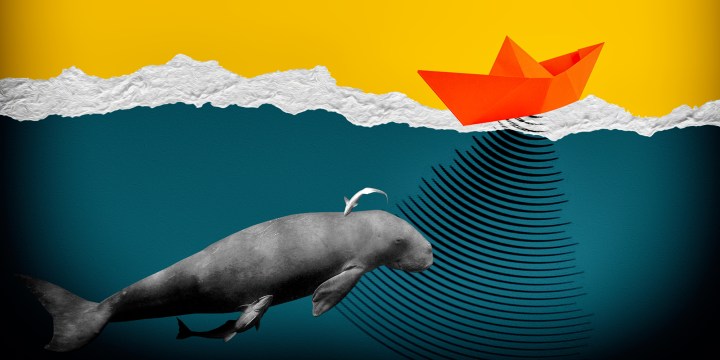
The global oil and gas survey company Searcher is gearing up to blast powerful sound waves into the Indian Ocean, directly adjacent to the last viable population of dugongs on Africa’s east coast.
Searcher’s hydrocarbon target area is a massive 42,000km2 swathe of sea adjoining the Bazaruto Archipelago National Park, a chain of five islands in central Mozambique famed for their idyllic white sand beaches, coral reefs and clear blue waters that make for exceptional diving and snorkelling.
Bazaruto is also home to the mermaid-like dugong, a beleaguered marine mammal that feeds on seagrass meadows. The neighbouring sea is considered to be a globally important living space for whales, dolphins, sea turtles and other marine species.
During the 1960s, large herds of hundreds of dugongs were reported as far north as Kenya and Somalia, but over recent decades their numbers have plummeted. The most recent scientific studies suggest there are now fewer than 250 adult dugongs left along the east African coast – and Bazaruto is home to about 90% of these survivors.
Just last year, the International Union for Conservation of Nature (IUCN) reclassified the east African dugong population as “critically endangered”, the highest level of risk before a species is declared extinct in the wild.
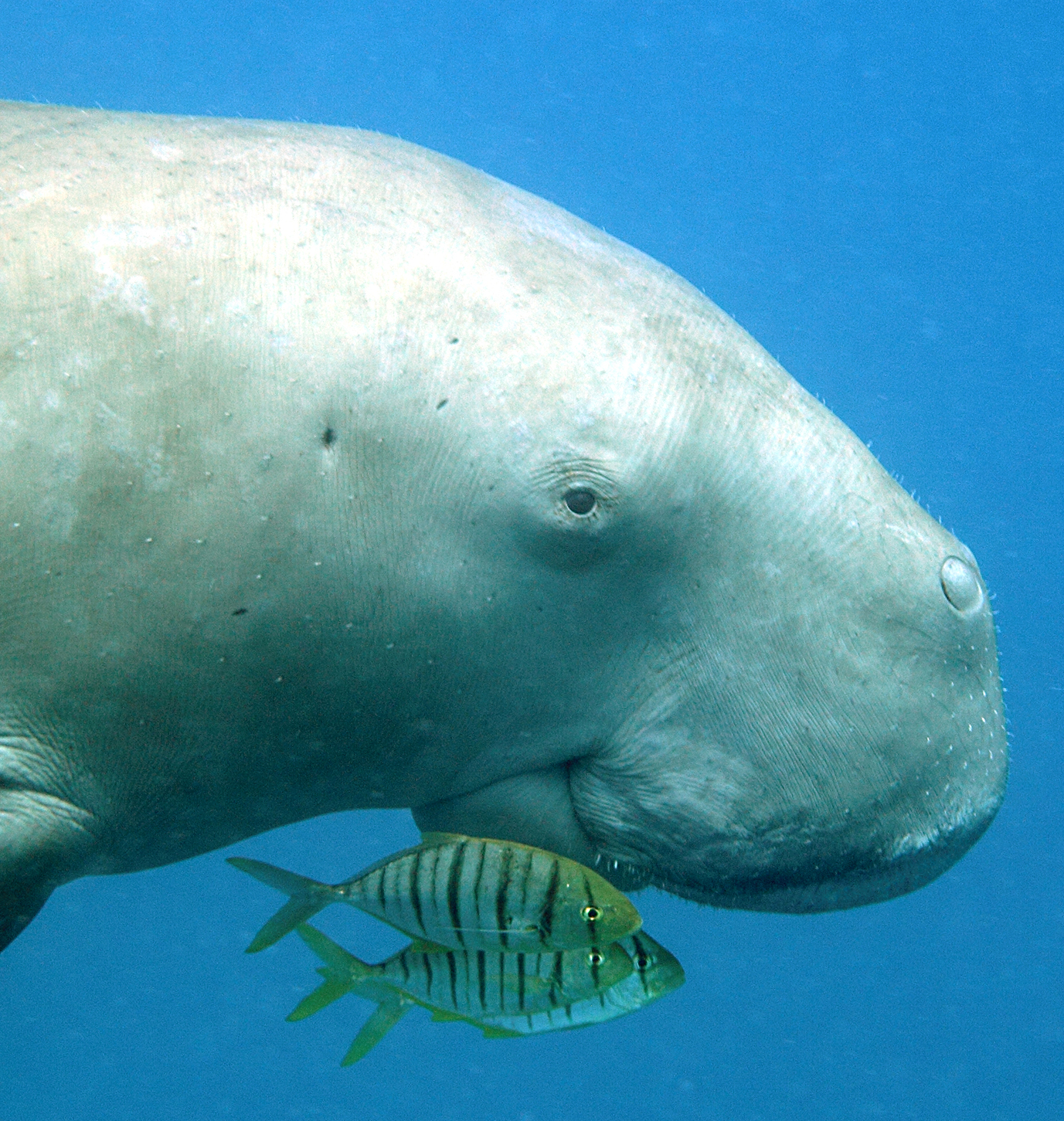
The east African population of dugongs is now classified as critically endangered. (Photo: Mandy Etpison)
Nevertheless, the Perth-based Searcher group has set its sights on a major 3-D seismic survey near Bazaruto that involves blasting sound waves into the sea to detect underground deposits of oil and gas. It remains unclear whether Searcher is acting on behalf of a single fossil fuels company, or if it is conducting a “multiclient” survey where new seismic data is sold off to several oil companies simultaneously.
Apart from the potential negative impacts of Searcher’s seismic survey near the islands, the future discovery and extraction of major hydrocarbon deposits off central Mozambique raises further concern about oil spills in such a sensitive marine environment.
Significantly, the South African fuel and chemicals giant Sasol previously commissioned similar hydrocarbon seismic studies in the vicinity of Bazaruto – but to its credit, Sasol abandoned its claim to the Mozambican oil and gas exploration blocks 16 and 19 three years ago after a massive public backlash and adverse environmental impact assessment (EIA) studies.
In a statement in July 2020, Sasol announced that it would relinquish its exploration ambitions near Bazaruto “in their entirety” following a pre-feasibility environmental assessment by Golder & Associates.
According to Sasol, it remained committed to compliance with all environmental legislation and undertaking any exploration activity in an environmentally responsible manner.
Searcher, however, has now commissioned similar mandatory EIA studies via the Maputo-based Impacto environmental consultancy group.
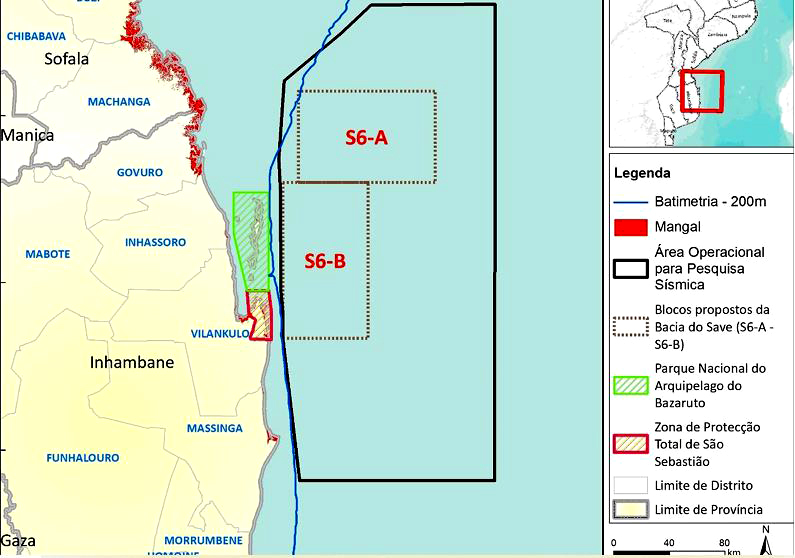
The proposed seismic survey area in relation to the Bazaruto Archipelago. (Map: Impacto EIA report)
According to Impacto, no “fatal environmental flaws” were identified during a recent pre-feasibility and scoping study, thus allowing an EIA study for proposed Searcher 3-D seismic project to move forward.
Apart from the potential negative impacts of Searcher’s seismic survey near the islands, the future discovery and extraction of major hydrocarbon deposits off central Mozambique raises further concern about oil spills in such a sensitive marine environment.
According to the most recent dugong assessment report by the IUCN, an oil spill in Saudi Arabia in 1991 may have been responsible for an observed decline in the local dugong population in that region.
The assessment notes that seagrass and other aquatic vegetation may also be vulnerable to oil spills while acoustic (sound) pollution associated with oil and gas exploration may also negatively impact the health of the Bazaruto dugongs.
Impacto’s summary document on the latest seismic survey suggests that Searcher plans to acquire nearly 11,000km2 of 3-D seismic data, carried out in water depths varying between 200m and 2,500m.
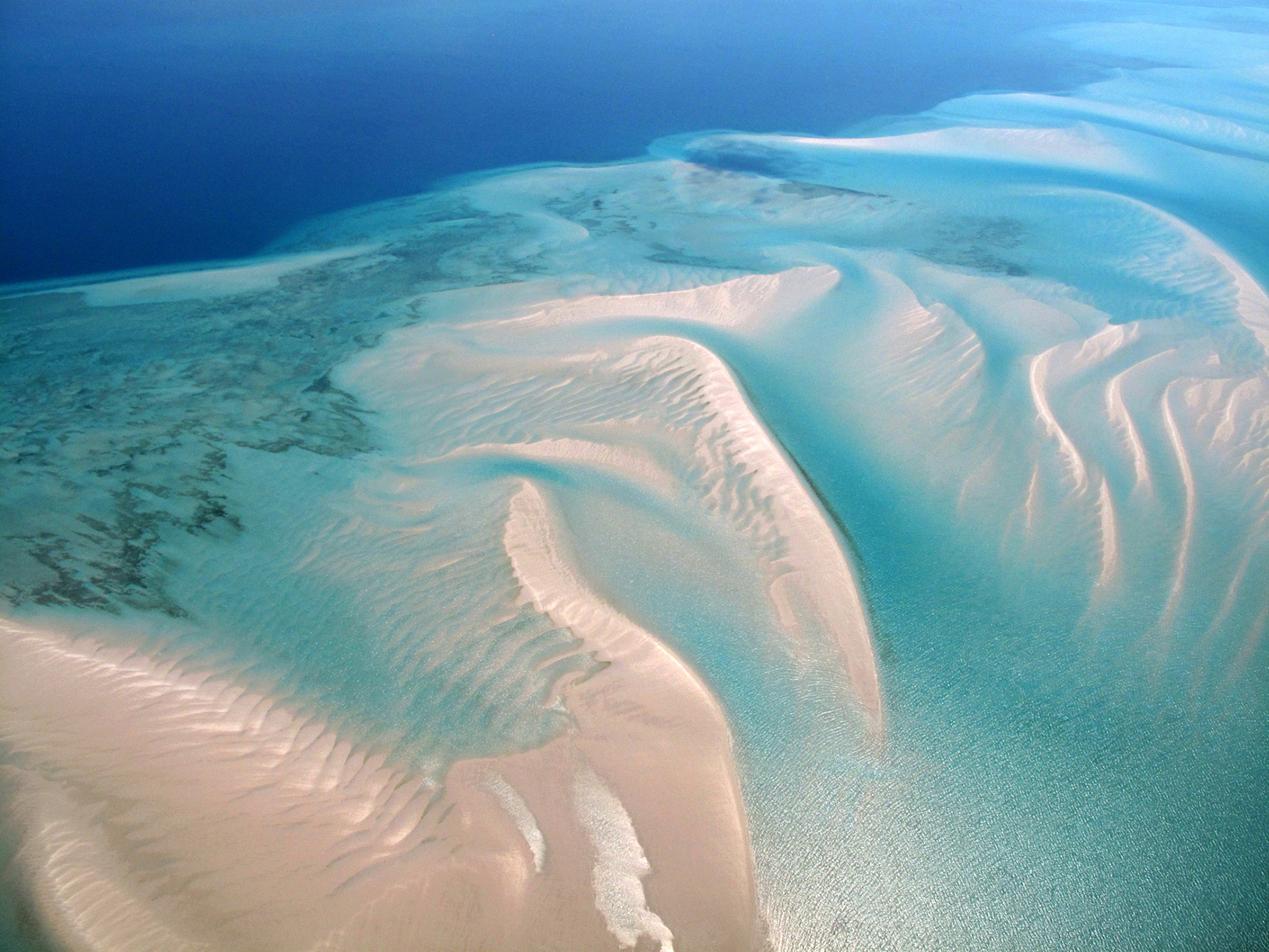
Sandbanks in the Bazaruto Archipelago National Park, which is home to more than 100 species of coral, 250 fish species and extensive beds of shallow-water seagrasses. (Photo: Paul Dutton)
Appeal for caution
Already, marine mammal experts are urging the Mozambique government and Searcher to proceed with caution given the high stakes for dugongs and other marine creatures.
In a letter of concern sent to Impacto public consultation coordinator Sandra Fernandes, marine ecology experts Dr Gill Braulik, Erich Hoyt and Dr Giuseppe Notarbartolo note that the seas immediately adjacent to the Bazaruto National Park have been identified as being of global importance for marine mammals.
Writing on behalf of the IUCN Joint Species Survival Commission/ World Commission on Protected Areas (Marine Mammal Protected Areas Task Force), the three experts say they fear that the proposed seismic survey could have several negative impacts for whales, dolphins and dugongs.
“The Bazaruto Archipelago to Inhambane Bay Important Marine Mammal Area is extremely significant as it supports a critically endangered population of dugongs which is the last remaining viable population in east Africa (Trotzuk et al. 2022) and habitat for the Indian Ocean humpback dolphin (Sousa plumbea), a coastal dolphin found only in the western Indian Ocean that is endangered and decreasing in numbers throughout its range (Braulik et al. 2018). In addition, the area is important for migratory humpback whales, sharks and rays, marine turtles, and marine birds.”
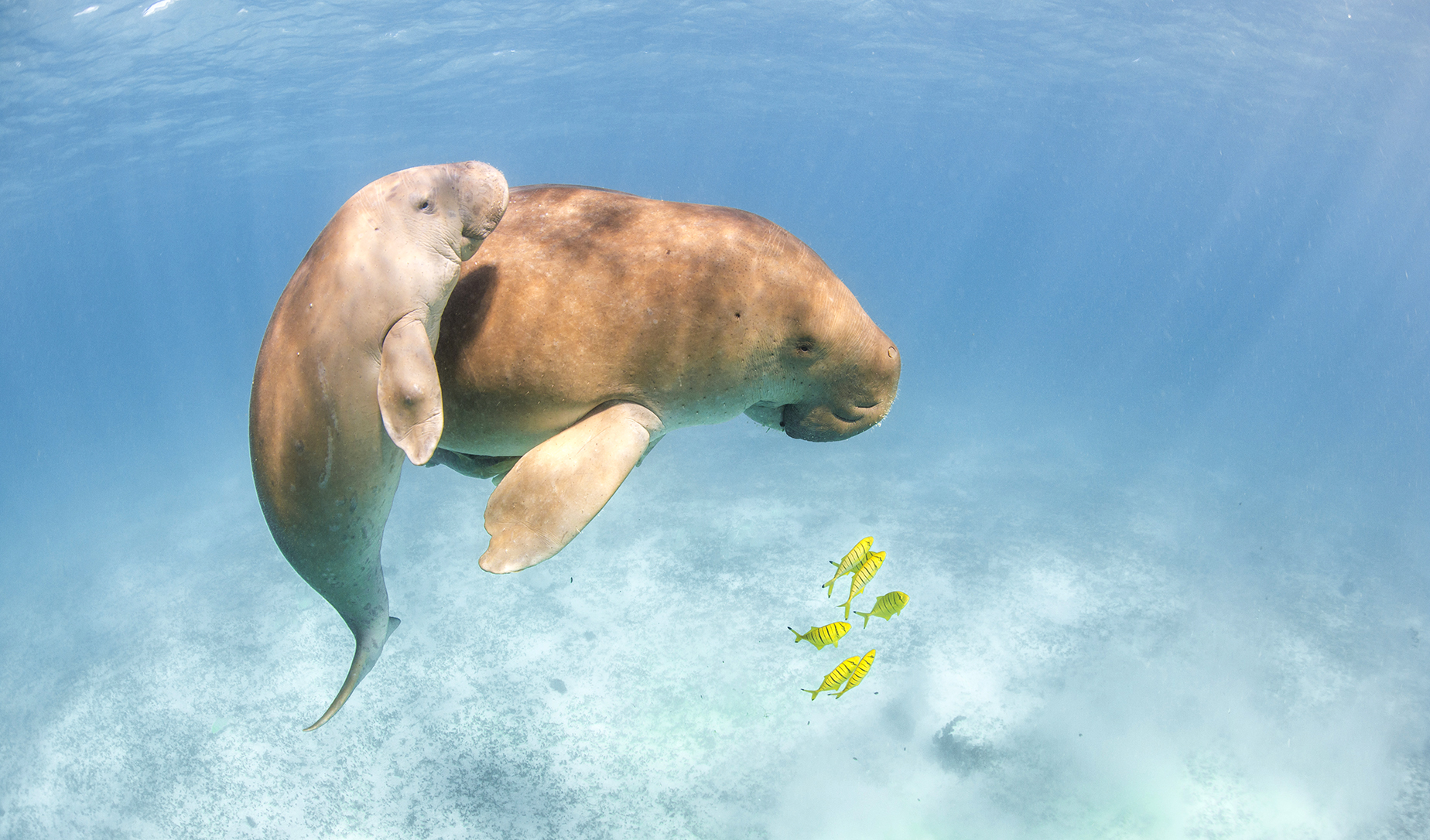
A dugong mother and calf off the coast of Australia. (Photo: Sam Lawrence and Ocean Collective Media)
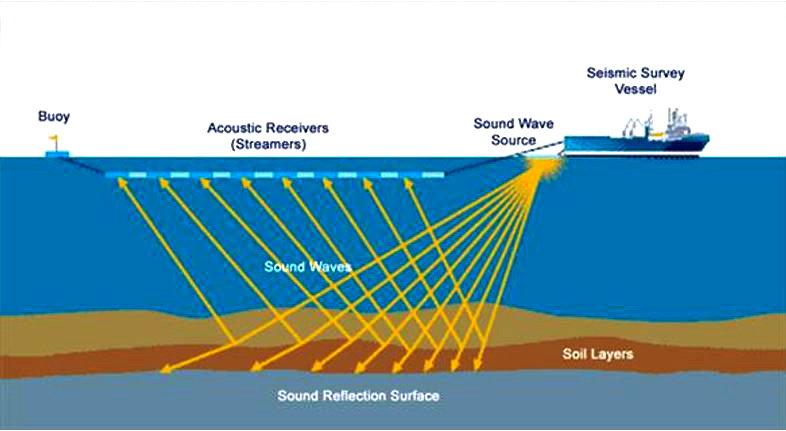
A schematic view of seismic survey operations. (Image: Impacto EIA report)
They further note that the coastal and deeper waters of the Mozambique channel are heavily used by thousands of humpback whales between May and November each year when they migrate to the area to find a safe haven for giving birth and breeding.
“Dolphins use calls and whistles to transmit information across long distances, connect groups and maintain social interactions, while humpback whales use underwater ‘song’ when breeding and make other sounds to communicate with their young. This means the soundscape of the waters they inhabit is vitally important to their lifecycle.”
Because marine seismic surveys involved the use of high-energy noise sources, possible impacts included interference with the animal’s natural acoustic communication signals; damage to their hearing systems and a range of behavioural changes.
Read more in Daily Maverick: Book of the Dead – the species declared extinct in 2022
“We also, respectfully, direct you to the Convention on Migratory Species, ‘Guidance on Environmental Impact Assessments for Marine Noise-generating Activities’ and encourage you that if the plans proceed, to ensure that the overall survey is as precautionary as possible, with rigorous and fully transparent monitoring so that, at the very least, the effectiveness of the monitoring and mitigation programme can be fairly evaluated.
“We understand that Mozambique is keen to consider more of its hydrocarbon resources as a route to economic development. However, it is important to recognise the great interest and global concern that surrounds the animals that are impacted by such development.
“We respectfully urge you to consider developing more sustainable renewable energies that are both compatible with economic development and will address climate change and are less likely to impact marine life.” DM
This story first appeared in our weekly Daily Maverick 168 newspaper, which is available countrywide for R29.




















 Become an Insider
Become an Insider
Typical alarmist nonsense and really poor reporting!!! Why don’t you actually state what distances are involved here instead of misrepresenting everything? Those blocks are beyond the continental shelf so “directly adjacent to” is an out and out lie, more like a couple of hundred miles away.
It’s no wonder people despise this type of nonsense – alarmist claptrap at best and devoid of the real facts and numbers